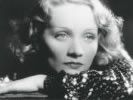Eye For Film >> Movies >> Marlene (1984) Film Review
It's 17 years since Marlene Dietrich died, 30 years since her last film appearance and more than half a century since the peak of her career. Yet she’s still a byword for exotic, liberated glamour, an old-style Hollywood legend – and one of the most renowned and imitated singers of all time, to boot.
All that, plus a colourful private life and a love/hate relationship with the country and city of her birth, would seem to make her an ideal subject for a full-length feature documentary. But Schell’s Oscar-nominated 1984 film remains the only attempt – and it quickly becomes clear why.

By that stage she had quit performing and lived a reclusive life in her Paris apartment, unwilling to talk to anyone she didn’t have to, much less give in-depth interviews on camera. Schell (perhaps best known to UK cinema audiences as the rent-a-Nazi bad guy in several World War Two dramas, but a major figure in European film and theatre as performer, writer and director) had been a fan for years. The two had appeared together in Stanley Kramer’s Judgment At Nuremberg and, after a lengthy series of negotiations, she agreed to co-operate on a documentary directed by him.
But there were several provisos – chief among them that their association was limited to '40 hours of talking' and that she was not to be filmed during the interviews. Realising that not having your subject on camera during your film (especially when that subject is one of the most iconic screen and stage presences of all time) is something of a drawback, Schell makes a virtue of necessity and constructs the film as a fragmented and elusive Chinese puzzle; clips from her films and stage shows are interspersed with anecdotes from her friends and associates and footage of the apartment during the interviews, in which the audience is given occasional glimpses of the great diva herself.
In the years since its initial release the film has acquired a hardcore of admirers and no doubt the IMDB bloggers who’ve tried to acquire a copy will be salivating at this DVD release. But I’m not sure Schell’s approach entirely works and I found myself initially irritated by both the film and its subject.
The Dietrich we hear on the interviews at first is a self-confessed "snotty Berliner"; prickly, haughty, easily bored and almost pathologically determined to keep her guard up. She is dismissive about her films, economical with the truth about her upbringing and virtually silent on her private life. She frequently ignores or ridicules Schell’s questions and generally gives the impression of wanting to be doing anything else but this.
It doesn’t help that the film takes a far from chronological approach to her story, flitting from her ‘discovery’ by the director Josef Von Sternberg, who cast her in The Blue Angel, to her legendary cabaret performances, then back to her arrival in Hollywood, where she wowed the American public and a succession of hapless leading men in classics like Blonde Venus, Destry Rides Again and A Touch of Evil.
The clips are a reminder that she possessed an upfront, mannish charisma the like of which hadn’t been seen before (or since) and a voice that still sends shivers even after years of hearing parodic or downright bad takes on “fallink hin luff akhain” and the rest of her repertoire. But great artists don’t have to be nice people and you may find yourself losing patience with the crabby old bat and wondering why, if she was so reluctant to talk about herself, she agreed to the film in the first place.
There’s also the suspicion that Schell is using the film’s ‘fleeting glimpse collage’ structure to add to the mythos of La Dietrich as permanently unknowable and mysterious, always metaphorically just off-camera in an indulgent and arty bit of Eurosmugness. But, given the limitations imposed on him, you have to cut the chap a certain amount of slack.
And as the film progresses, Dietrich does begin to open up a bit and the two develop a bantering, entertaining relationship - though not one without the occasional flare-up. She talks movingly about her reaction to being branded a ‘traitress’ for denouncing the Nazis and throwing herself into helping the American war effort, as well as her friendships with the likes of Spencer Tracy, Orson Welles and Ernest Hemingway, a link to an era when Hollywood stars were more than bland, uncontroversial quote machines.
As she sings an old Berlin schlager over footage of the bombed-out postwar city, or Schell runs a clip of her final performance in Just A Gigolo, old and careworn but still possessing ‘it’ in spades, you realise that hers was a remarkable life, lived on its own terms, and a remarkable cinematic legacy.
It’s a frustrating, almost maddening, film at times and I think Schell himself finally realises that the best thing is to let her movies and songs speak for themselves. But in an era when the most mediocre performers are given lengthy adulatory profiles in DVD extras, few could deny that Marlene Dietrich deserves a full-length tribute. And I suspect that if the film had nailed her secret or penetrated her mystique, the crafty old girl would have been absolutely mortified.
Reviewed on: 25 Aug 2009




















